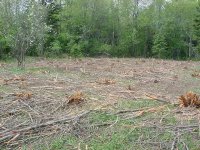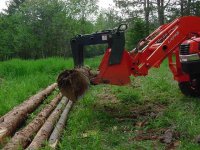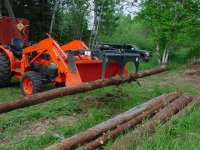MarkV
Super Member
- Joined
- Apr 7, 2000
- Messages
- 5,698
- Location
- Cedartown, Ga and N. Ga mountains
- Tractor
- 1998 Kubota B21, 2005 Kubota L39
Mac, I guess we as land owners would be responsible if the fires were to get out of control but I am not really sure. We were using a forester that my Father in Law has used for years and doing it how and when he said the time was right. I’ll have to ask and see what kind of insurance the forester carries. When the state forester came and looked at my land I ask about responsibly and was told it would not be a problem if we did it their way. I know, that isn’t a very definitive answer.
In the burn I was involved with it is hard to imagine the fire getting away. Conditions were damp with little wind; the fuel was slash that had been on the ground for a couple of years and new growth less than waist high. The property was logged 60% with the remaining 40% of trees left being mostly mature pine that is too big to get started with the small fire line we were running. We have 10 foot wide fence line roads around the property that were cleaned up with a dozer to serve as a fire break before the burn. I believe that proper timing is the key and also why we hired a pro to say when that was.
EastTexFrank, there are a few things you want to check on and see how they work in your area. Here you can contact loggers directly and get a price for the timber or use a forester to evaluate the timber, sell it and negotiate the logging contract. We were not clear cutting so the forester evaluated the timber stand for quality and quantity, marked all the trees that were to be left, marked the boundaries of the cut, shopped the best price from the buying mills, hired a logging crew and set up the contract and conditions with the logging crew. Of course he also takes a percentage off the top of the sale. Some feel that percentage is partly off set by the forester getting a better price for the timber than an inexperienced seller working directly with a logger.
Like everything there are good and bad loggers. There are many stories of loggers draining hundreds of gallons of hydraulic fluid on the land, leaving skidder tires for you to deal with, grabbing a few extra trees from the neighboring property, destroying fences and access roads, among other things. The biggest thing I hear is the land owner thinking the logger agreed to clean up and the logger has a different definition of clean. There is a good amount of money involved when logging 60 acres so be sure to have a real good legal contract defining everything to be done very clearly.
I would also suggest you talk to your tax consultant before you log. The profits from logging are handled differently than other capital gains in our state and they get you pretty good. You may be able to have the logging and clean up done under one contract so you show less capital gains.
MarkV
In the burn I was involved with it is hard to imagine the fire getting away. Conditions were damp with little wind; the fuel was slash that had been on the ground for a couple of years and new growth less than waist high. The property was logged 60% with the remaining 40% of trees left being mostly mature pine that is too big to get started with the small fire line we were running. We have 10 foot wide fence line roads around the property that were cleaned up with a dozer to serve as a fire break before the burn. I believe that proper timing is the key and also why we hired a pro to say when that was.
EastTexFrank, there are a few things you want to check on and see how they work in your area. Here you can contact loggers directly and get a price for the timber or use a forester to evaluate the timber, sell it and negotiate the logging contract. We were not clear cutting so the forester evaluated the timber stand for quality and quantity, marked all the trees that were to be left, marked the boundaries of the cut, shopped the best price from the buying mills, hired a logging crew and set up the contract and conditions with the logging crew. Of course he also takes a percentage off the top of the sale. Some feel that percentage is partly off set by the forester getting a better price for the timber than an inexperienced seller working directly with a logger.
Like everything there are good and bad loggers. There are many stories of loggers draining hundreds of gallons of hydraulic fluid on the land, leaving skidder tires for you to deal with, grabbing a few extra trees from the neighboring property, destroying fences and access roads, among other things. The biggest thing I hear is the land owner thinking the logger agreed to clean up and the logger has a different definition of clean. There is a good amount of money involved when logging 60 acres so be sure to have a real good legal contract defining everything to be done very clearly.
I would also suggest you talk to your tax consultant before you log. The profits from logging are handled differently than other capital gains in our state and they get you pretty good. You may be able to have the logging and clean up done under one contract so you show less capital gains.
MarkV




